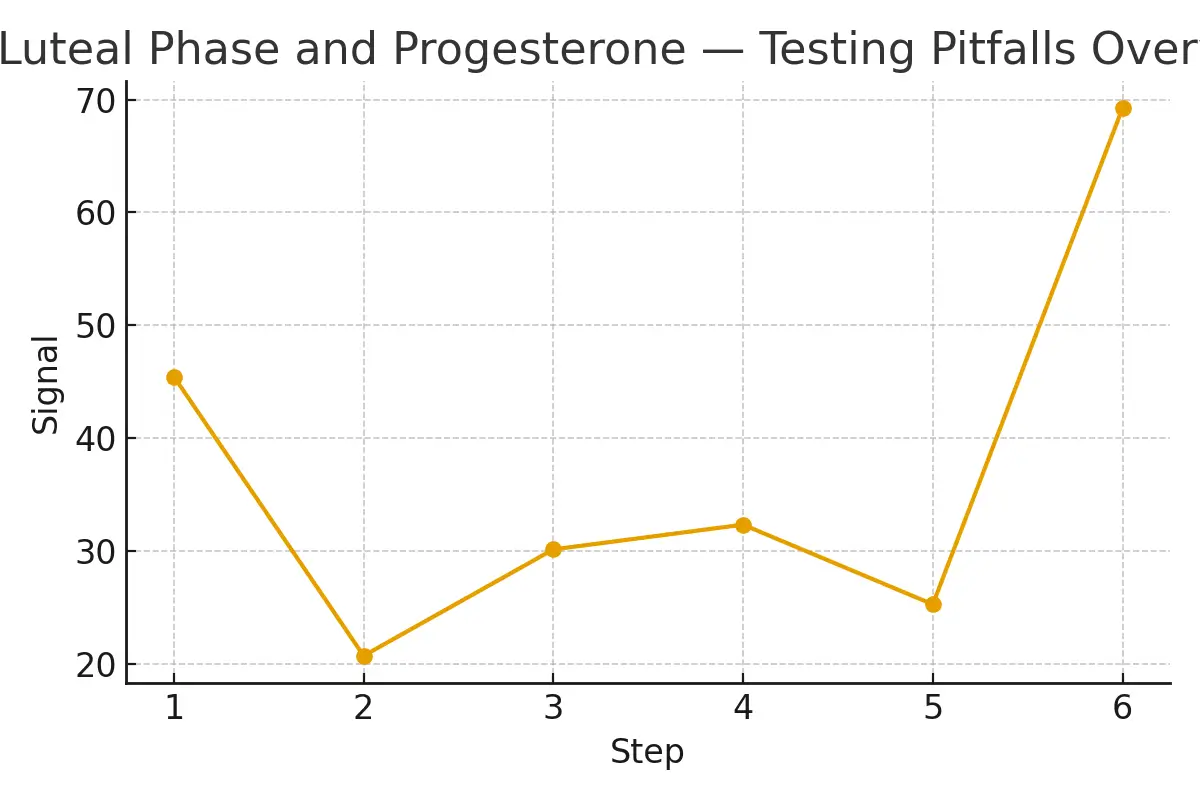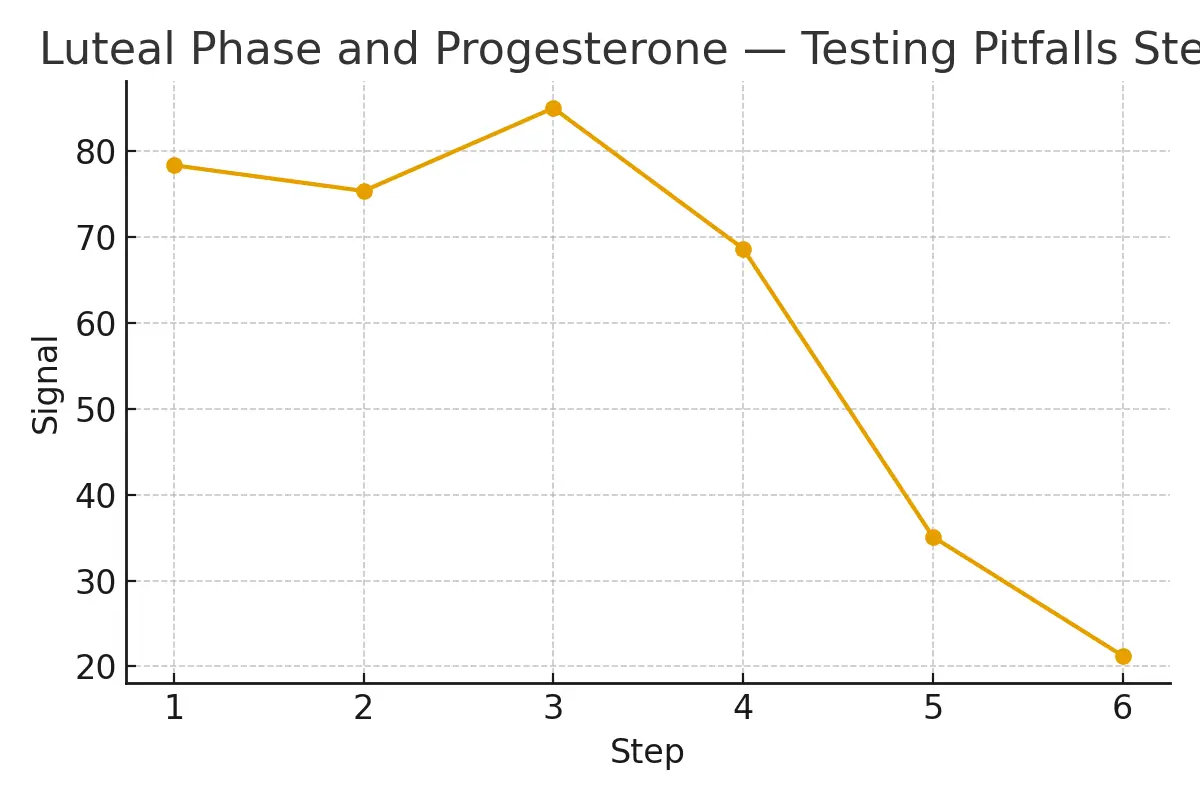
The luteal phase plays a vital role in fertility and IVF success. Understanding progesterone levels and timing tests correctly can make the difference between inconclusive results and a clear path to pregnancy. This guide explores common testing pitfalls, timing errors, cost factors, and decision points in the fertility journey—especially for patients in NYC navigating modern IVF care with realistic expectations and transparent costs.
Understanding the Luteal Phase and Its Role in Fertility
The luteal phase occurs after ovulation and before menstruation begins. During this stage, progesterone levels rise to prepare the uterine lining for implantation. If conception doesn’t occur, progesterone drops, and the cycle resets.
For those undergoing IVF or fertility treatments, monitoring progesterone ensures the timing between embryo transfer and endometrial receptivity is synchronized. An imbalance or mistimed test can reduce implantation odds or misguide treatment adjustments.
Where Luteal Phase Testing Fits in the IVF Journey
Step-by-Step Overview
- Baseline Evaluation: Bloodwork and imaging help identify ovulation and hormone levels.
- Ovulation Tracking: LH surge and temperature monitoring guide the expected luteal phase start.
- Progesterone Testing (Day 21 Test): Usually conducted about 7 days after ovulation, though “day 21” can vary depending on cycle length.
- Follow-Up Assessment: Repeated tests may confirm if levels remain supportive for implantation.
- Adjustments During IVF: Doctors may prescribe luteal phase support—progesterone injections or vaginal gels—to stabilize hormone levels after embryo transfer.
Common Testing Pitfalls
1. Wrong Timing
Testing too early or too late can yield misleading progesterone values. The “day 21” rule applies only to 28-day cycles—many patients have variations.
2. Ignoring Individual Variability
Stress, sleep, medications, and cycle irregularities can all shift hormone levels, leading to false interpretations.
3. Over-reliance on Single Values
A one-time progesterone test cannot always confirm ovulation or predict IVF success rates. For patients navigating the fertility journey in NYC, relying on a single reading can lead to misinterpretation. Instead, serial testing or ultrasound correlation offers better accuracy and helps create a clearer, more reliable IVF patient journey.
4. Lab Variability
Different labs use different reference ranges, so cross-checking results with your fertility clinic is essential.
Who Benefits from Luteal Phase Testing
- Couples with unexplained infertility
- IVF patients facing repeated implantation failure
- Individuals with irregular menstrual cycles
- Those using fertility medications or donor eggs.
Identifying luteal phase issues helps clinicians personalize care—reducing treatment fatigue, unnecessary interventions, and overall IVF costs.
Cost and Practical Considerations
In NYC, a typical luteal phase progesterone test costs between $80–$200, depending on the clinic and lab.
Additional costs may arise for:
- Repeat testing ($50–$100 per draw)
- Hormonal support medication ($150–$600 per cycle)
- IVF cycle coordination ($8,000–$15,000 per cycle)
Transparent pricing and cumulative cost planning can prevent surprise bills and improve emotional readiness for patients.
Controlling Outcome Drivers
Some factors are controllable, others only monitorable:
- You Control: timing of testing, medication adherence, and lifestyle choices (nutrition, sleep, stress).
- You monitor: lab quality, clinician communication, and biological variability.
Maintaining clear communication with your fertility team helps align all moving parts for optimal success rates.
Key Questions to Ask Your Clinic
- How do you time progesterone testing relative to my ovulation?
- Do you use the same lab for consistency?
- What’s your threshold for luteal phase support?
- How does progesterone affect my IVF transfer plan?
- Can I view my cost breakdown before starting treatment?
Expert Quote
“Protect timing and keep plans simple—quality improves when noise goes down.” — Clinical Team
Patient Case Study
A Manhattan couple faced inconclusive progesterone readings during two IVF cycles. After switching clinics, testing was aligned precisely with their ovulation trigger. The result—clear hormone patterns, targeted luteal support, and a successful pregnancy within one cycle. Better timing and communication simplified the journey.
Testimonials
“The steps finally made sense.” — A.&J., Manhattan
“Costs were clear; no surprise bills.” — L., Hoboken
“Nurses replied fast with practical coaching.” — K.&V., Queens
Next Steps with Surrogacy4All
Get clarity in your fertility journey with Surrogacy4All. You can book a free 15-minute nurse consultation, upload your lab results for a second opinion, or request a detailed cost breakdown tailored to your case. At Surrogacy4All, we help patients in NYC and beyond simplify their IVF journey, understand true success rates, and make informed decisions with compassion and transparency. Contact us today!
Frequently Asked Questions (FAQs)
Q: Is this medical advice?
Ans. No. Use this information to guide discussions with your fertility specialist.
Q: How many cycles should I plan for IVF?
Ans. Success improves cumulatively; expect 2–3 cycles for best odds.
Q: What drives IVF cost most?
Ans. Medication, lab work, and number of cycles.
Q: Can progesterone imbalance cause infertility?
Ans. Yes, inadequate luteal support can hinder implantation.
Q: Is testing different for natural vs. medicated cycles?
Ans. Yes, timing and hormone patterns differ—your clinic will personalize testing.

Dr. Kulsoom Baloch
Dr. Kulsoom Baloch is a dedicated donor coordinator at Egg Donors, leveraging her extensive background in medicine and public health. She holds an MBBS from Ziauddin University, Pakistan, and an MPH from Hofstra University, New York. With three years of clinical experience at prominent hospitals in Karachi, Pakistan, Dr. Baloch has honed her skills in patient care and medical research.






